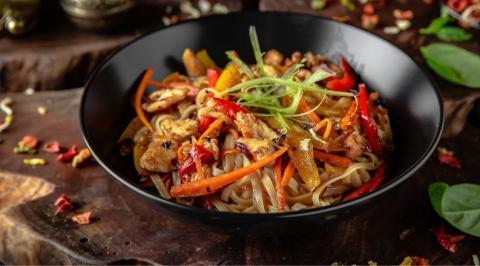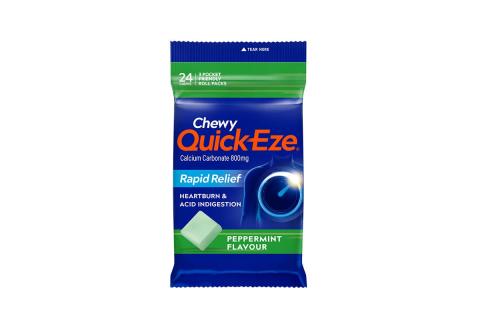Savour the spice: Tips for easing heartburn from spicy food
Imagine you could enjoy a hearty curry without the fear of heartburn. Spicy foods are famous for triggering that dreaded burning sensation in the stomach – but don’t worry, there are things you can do to relieve your acid reflux symptoms.
Spicy foods contain capsaicin [1], an active component in chili peppers which can slow down the rate of digestion. When your digestion is slowed, food then sits in your stomach for longer making you more prone to the symptoms of acid reflux such as heartburn. [2]
Common symptoms of digestive discomfort
After eating a spicy meal like a hot tom yum soup, you may experience heartburn and acid reflux, with symptoms like regurgitation and stomach discomfort.[3] This discomfort may feel like a burning or warmth in the chest area, known as heartburn, which can be accompanied by a sour or bitter taste in the mouth due to regurgitation of stomach acid.
Symptoms of heartburn and acid reflux from spicy food are likely to occur shortly after eating the food, especially if it is particularly spicy or eaten in large quantities.[4] For instance, if you enjoyed a tasty vindaloo late at night, your symptoms could be more noticeable, as lying down can aggravate acid reflux symptoms by allowing stomach acid to flow up into the oesophagus more easily.[5]
Understanding when symptoms are likely to occur can help you take proactive measures to ease heartburn and digestive discomfort, such as avoiding large or spicy meals before bedtime and adopting strategies to manage acid reflux triggers.
Types of spicy foods that may trigger heartburn and acid reflux
Certain types of spicy foods can be more likely to trigger heartburn and acid reflux due to their specific ingredients and levels of spiciness. Hot peppers, curries, and dishes containing certain sauces like sriracha, or hot sauce are known to cause digestive discomfort for some people. These foods can irritate the stomach lining and lead to increased stomach acid production, resulting in heartburn and acid reflux symptoms.[5]
To minimise the impact of spicy foods on heartburn and acid reflux, you could consider certain preparation techniques. For example, in some cases removing seeds and the pith from chili peppers before cooking can reduce the overall spiciness of the dish.[6] Additionally, some spicy dishes like curries call for fatty ingredients such as cream, which can increase the risk of heartburn as they take longer to digest. [7] Try substituting an ingredient like this with low-fat yogurt. These simple adjustments in food preparation can make a big difference in easing heartburn and digestive discomfort caused by consuming spicy foods.
Managing and easing heartburn from spicy food
To help reduce the discomfort of heartburn and acid reflux caused by spicy foods, it's important that you consider your eating habits, meal planning and overall digestive health. This will help you to reduce the likelihood of experiencing heartburn and digestive discomfort while still savouring the flavours and benefits of spicy cuisine. It's all about finding a balance that works for your digestive system and overall wellbeing. Here are some tips to help you incorporate spicy foods into your diet.

Choose healthier spicy options
Go for healthier spicy foods that are less likely to trigger heartburn, such as grilled or roasted spicy chicken or fish, vegetable stir-fries with a hint of spice, or spicy bean chilli with lean protein sources.[8] These options can provide flavour increasing your risk of acid reflux. Remember though, everyone is different so make sure you monitor how different foods affect you.
Balanced meal planning
Incorporate spicy foods into a balanced diet that includes plenty of fibre, protein, and healthy fats. Fibre-rich foods like whole grains, fruits, and vegetables can help support digestion and alleviate acid reflux.[9] Including lean proteins and healthy fats can also aid in maintaining a well-rounded diet.
Experiment with different spices and herbs
Consider adding a variety of spices and herbs to your dishes. This can help enhance flavour while adding nutritional value. Some popular choices include turmeric, ginger, and fennel, which are known for their potential health benefits.
Mindful eating habits
Pay attention to your eating habits, meal timing, and bedtime after consuming spicy foods. [10] Avoid eating large meals right before bedtime, as lying down can intensify acid reflux symptoms. Practice mindful eating by chewing food slowly and thoroughly to aid digestion.
Practice moderation
While spicy dishes can be delicious, it's important to listen to your body and consume them in moderation. If you experience discomfort after eating spicy foods, consider reducing the amount or frequency of consumption.
Natural remedies and hacks for easing heartburn
When managing symptoms of heartburn and acid reflux triggered by spicy foods, there are several natural remedies, lifestyle hacks, and over-the-counter solutions that can help alleviate discomfort. Here are some strategies to consider:

Natural remedies
- Ginger tea: Drinking ginger tea can help soothe the digestive system and may help reduce the production of stomach acid. Ginger is known for its anti-inflammatory properties and can aid in digestion.[11]
- Chamomile Tea: Chamomile tea is another natural remedy that may help calm the stomach and reduce acid reflux symptoms.[12]
- Aloe vera juice: Consuming a small amount of aloe vera juice may provide relief from heartburn and soothe the oesophagus.[13]
- Elevate your head: When sleeping, elevate your head slightly to prevent stomach acid from flowing up into the oesophagus.[14]
- Avoid tight clothing: Wearing loose-fitting clothing can help reduce pressure on the stomach and minimise discomfort.[15]
- Practice stress-relief techniques: Stress can exacerbate heartburn symptoms, so incorporating stress-relief techniques like meditation or yoga may help manage symptoms.[16]
-
Antacids: Quick-Eze® can provide temporary relief from heartburn by neutralising stomach acid. It can be useful for occasional heartburn caused by spicy foods.
If you experience persistent or discomforting symptoms of heartburn and acid reflux after trying natural remedies and other solutions, you should consult a healthcare professional. Persistent heartburn may be a sign of a more serious underlying condition that requires medical evaluation and treatment.
Lifestyle hacks
- Elevate your head: When sleeping, elevate your head slightly to prevent stomach acid from flowing up into the oesophagus.[14]
- Avoid tight clothing: Wearing loose-fitting clothing can help reduce pressure on the stomach and minimise discomfort.[15]
- Practice stress-relief techniques: Stress can exacerbate heartburn symptoms, so incorporating stress-relief techniques like meditation or yoga may help manage symptoms.[16]
Rapid relief
- Antacids: Quick-Eze® can provide temporary relief from heartburn by neutralising stomach acid. It can be useful for occasional heartburn caused by spicy foods.
Consulting a healthcare professional
- If you experience persistent or discomforting symptoms of heartburn and acid reflux after trying natural remedies and other solutions, you should consult a healthcare professional. Persistent heartburn may be a sign of a more serious underlying condition that requires medical evaluation and treatment.
The key to easing heartburn
Next time you sink your teeth into a plate of saucy buffalo wings, you can now experience the flavour without the fear of heartburn. Spicy foods like these fiery favourites can be a common trigger for that burning sensation in the stomach, but by following the tips above, you can keep symptoms of acid reflux at bay and enjoy your wings without worry.
[1]https://www.ncbi.nlm.nih.gov/pmc/articles/PMC10078540/
[2] https://hartfordhospital.org/about-hh/news-center/news-detail?articleId…
[3] https://www.healthline.com/health/gerd/foods-to-avoid#spicy-foods
[4] https://my.clevelandclinic.org/health/diseases/9617-heartburn-overview
[5] https://www.webmd.com/heartburn-gerd/heartburn-basics
[6] https://www.foodrepublic.com/1332904/pepper-spice-actually-isnt-in-seed…
[7] https://www.webmd.com/heartburn-gerd/features/cooking-meals
[8] https://www.healthline.com/health/gerd/diet-nutrition
[9] https://www.ncbi.nlm.nih.gov/pmc/articles/PMC6702398/
[10] https://www.sleepfoundation.org/nutrition/is-it-bad-to-eat-before-bed
[11] https://www.healthline.com/health/digestive-health/ginger-for-acid-reflux#benefits
[13] https://www.webmd.com/diet/supplement-guide-aloe-vera
[14] https://www.healthdirect.gov.au/gord-reflux
[15] https://www.gastrodoxs.com/blog/5-habits-that-make-acid-reflux-worse
Frequently asked questions about spicy food and heartburn
What helps heartburn from spicy food?
Over-the-counter antacids can provide relief from heartburn. Antacids, such as Quick-Eze®, can provide relief by neutralising excess stomach acid, offering temporary comfort from heartburn caused by spicy foods.
How long does acid reflux last after spicy food?
The duration of acid reflux after consuming spicy food can vary greatly from person to person depending on several factors. These factors can include the amount and type of spicy food eaten, an individual’s sensitivity to certain ingredients, and their overall diet and lifestyle. Additionally, how your body responds to food, including factors such as stress levels and eating habits, can influence how long symptoms last. For those who experience ongoing or frequent episodes of acid reflux, it may be beneficial to keep a food diary or consult with a healthcare professional to identify triggers and discuss management options. If symptoms persist or worsen over time, seeking advice from a medical professional is recommended for proper assessment and guidance.
How do you prevent heartburn when eating spicy food?
To manage potential discomfort and heartburn from spicy foods, here are a few things to try:
- Try milder alternatives: Experiment with less spicy versions of your favourite dishes or opt for milder spices.
- Reduce portion sizes: Consuming smaller amounts of spicy foods can help lessen their impact on your digestive system.
- Avoid eating spicy foods close to bedtime: This can help prevent heartburn while you sleep.
- Include fiber-rich foods and lean proteins: These can contribute to a balanced meal and may help support digestion.
Remember, individual tolerance to spicy foods varies. If you frequently experience heartburn or other digestive issues after eating spicy dishes, it may be best to avoid them or consume them in moderation.
How do you get rid of spicy food indigestion?
Indigestion caused by spicy foods can be uncomfortable. To manage symptoms, consider these tips: stay hydrated, try natural remedies like ginger tea or chamomile tea, avoid irritants, practice stress management, eat moderately, and consult a healthcare professional if needed. Remember, individual experiences can vary, so listen to your body and adjust your approach as necessary.
How do you ease heartburn symptoms?
If you're looking to ease heartburn symptoms, there are a few things that might help. Many people find that avoiding large meals and eating slowly can make a difference. [15] It can also help to steer clear of foods that are known to trigger discomfort, like spicy or fatty dishes, citrus, and caffeine. Staying upright for a while after eating can also be useful, as lying down too soon can sometimes make symptoms worse. [15]
You can also keep a product like Quick-Eze® on hand for when you feel discomfort, but it's always a good idea to speak with your doctor if heartburn is something you deal with regularly. They can offer advice that’s tailored to your needs.
Does eating spicy food cause heartburn?
Spicy foods can sometimes cause discomfort. Some individuals may experience heartburn or acid reflux after consuming spicy dishes, which can be sure to the combination of spicy ingredients like capsaicin and individual sensitivity.
If you're prone to heartburn, it's wise to enjoy spicy foods in moderation or avoid them altogether. Experiment with different spices and herbs to find those that suit your digestive system best.






